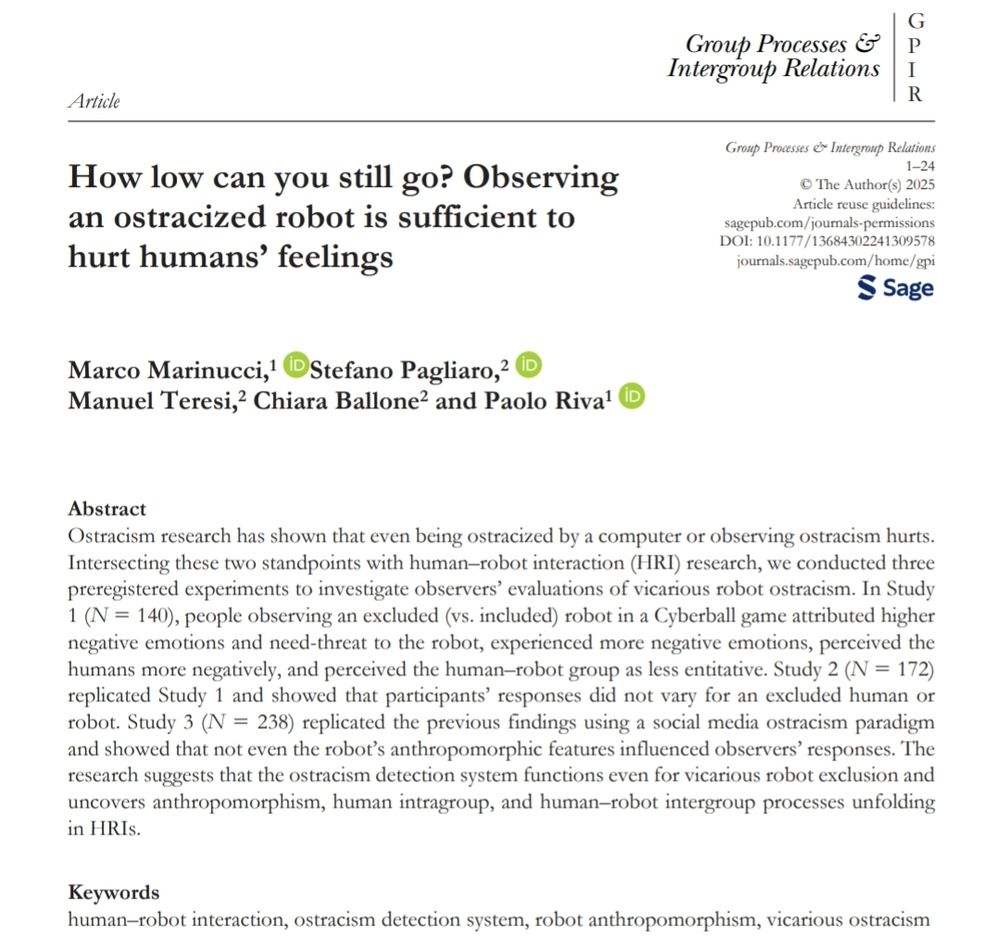
The effects were the same as when it was a human who was excluded, and between low and high anthropomorphic robots. Interpersonal and intergroup processes apply also to robot outgroups!
24.01.2025 11:31 — 👍 0 🔁 0 💬 0 📌 0

Implicit anthropomorphism processes make participants attribute negative mental states to the excluded robot; ostracism detection system makes them "feel" the ostracism; moral and group processes lead to a negative evaluation of the human excluders and to perceive the group as less entitative.
24.01.2025 11:31 — 👍 0 🔁 0 💬 1 📌 0

Do you care if a robot is left aside? Apparently, you do. In our latest research with three preregistered studies we found that people experienced negative emotions when observing a robot being excluded
doi.org/10.1177/1368...
24.01.2025 11:31 — 👍 1 🔁 0 💬 1 📌 0
Let me know if you're a social psychologist and would like to be added to this starter pack.
go.bsky.app/B5LmAbf
07.11.2024 19:34 — 👍 76 🔁 38 💬 70 📌 1

We found that experiencing social exclusion was a key process conveying the effects on attitudes and prosocial intentions. Also, the effects were stronger when homelessness was experienced through a 360° video in 3D-VR compared to the same video watched on a 2D screen
08.11.2024 13:01 — 👍 2 🔁 0 💬 0 📌 0

Homelessness in Virtual Reality: Experiencing Social Exclusion Improves Attitudes and Behaviors Toward Unhoused People | Cyberpsychology, Behavior, and Social Networking
Virtual reality (VR) interventions are receiving increasing attention from research seeking to promote harmonious intergroup relations. Despite this, the effectiveness of VR methods and the underlying mechanisms for enhancing intergroup relations yield mixed findings. The current research examined if a 360° immersive video where participants embodied an unhoused person could improve attitudes and behavioral intentions toward unhoused people by making participants experience social exclusion and its psychological repercussions. The study (N = 210) adopted a 2 × 2 between-subject design where participants were assigned to embody an unhoused or housed person either watching the video in VR (in 3D using head-mounted devices) or in 2D (on a monitor). The study included a followup after 9 days. Results revealed that embodying the unhoused person (vs. housed control) led to increased experiences of social exclusion, need-threat, and negative emotions. These experiences, in turn, were associated with reduced negative attitudes toward unhoused individuals and heightened intentions to engage in charitable behaviors. Notably, the effects on attitudes and behavioral intentions persisted at the followup, with a stronger impact observed for participants who embodied the unhoused person in 3D compared to 2D. The findings suggest that tailoring VR video interventions to elicit social exclusion by embodying the perspective of marginalized social groups can enhance intergroup attitudes and intentions over time. Overall, this research underscores the prominence of VR-based interventions in improving intergroup harmony compared to less-immersive paradigms.
In our new research we found that experiencing homelessness in VR can lead to improved attitudes and behavioral intentions toward homeless people, lasting up to a follow-up after ten days
www.liebertpub.com/doi/10.1089/...
08.11.2024 13:00 — 👍 6 🔁 3 💬 1 📌 0
But that's awesome! Me pls
08.11.2024 12:58 — 👍 2 🔁 0 💬 1 📌 0

Chronic Social Exclusion, Radicalization, and Extremism (Chapter 12) - Exclusion and Extremism
Exclusion and Extremism - May 2024
Marco Marinucci and Paolo Riva’s chapter “Chronic Social Exclusion, Radicalization, and Extremism” in the new book "Exclusion and Extremism: a Psychological Perspective," edited by Michaela Pfundmair, Andrew Hales, and Kip Williams
#SocialPsyc #Psychology PoliSky
30.05.2024 13:56 — 👍 8 🔁 2 💬 1 📌 0
PhD Researcher @QUB | Social and Developmental Psychology | she/her
🌈Kids in Context research centre https://www.qub.ac.uk/research-centres/kidsincontext/
The Social Psychology Research Group in the School of Psychology, is a group of social and personality psychologists whose research focuses on social emotions and judgements, gender and sexuality, the self and interpersonal relationships.
The Stress, Health, & Behaviour Lab is based in the School of Applied Psychology at Griffith University in Brisbane, Australia. stresshealthbehaviour.com
Director: @jacobkeech.bsky.social
Senior researcher and lecturer at the University of Geneva, working on political violence.
Explore the mind's quirks through cognitive science on the cognitations podcast. Recorded @ Cambridge, ENS-PSL & Uni Grenoble Alpes.
Listen now: tinyurl.com/4xcczc4n
Official BlueSky feed for the BPS Social Psychology Section
Follow #spsconf for conf updates & #SocialSecComt to meet the Committee
Gender Scholar
Researching (a)sexualities, health communication, masculinities, contraception/safer sex, repro health, climate crisis, IR, peace/conflict studies, utopias/dystopias, mental health, media, history,...
https://orcid.org/0009-0009-7802-2721
PhD Student in Social Psychology at LAPSCO, University Clermont Auvergne, France
Research focuses on Prejudice, Social Dominance, Intergroup Relations
Assistant Professor in Social Psychology at Jagiellonian University in Krakow (Poland). Does research in social and political psychology, conspiracy beliefs, intergroup relations and trust in contexts of crises.
Teacher and social/political psychologist. 🇳🇬
Reposts and likes do not mean endorsement.
Research fellow in social psychology at the University of Queensland. Climate Change | Aesthetics | Morality
Social Psychology publishes innovative research and serves as an international forum for scientific discussion and debate in social psychology.
Editor: @akfetterman.bsky.social
https://www.hogrefe.com/us/journal/social-psychology
Ph.D. Student in Social Psychology @University of Milano-Bicocca | Researching Social Connection and Social Exclusion in the Digital Era | Ghosting, Phubbing, Human-AI Interaction
PhD student at Center for Social Psychology // University of Basel
Social Psychologist at the University of Queensland, Australia. Research interests include group processes, social identity and intergroup relations.
Postdoctoral researcher @TUChemnitz | Media Psychology | Research on social exclusion, social media, and coping
JESP features research in social psychology that use experimental or quasi-experimental methods or findings that push existing theories in new and needed directions!
Université libre de Bruxelles (ULB) - Suivez-nous et restez informé·es de toutes nos activités et événements!
#ULB
at University for Continuing Education Krems, Austria (www.donau-uni.ac.at/en/mig)
We want to contribute to a better understanding of migration and integration with our research and teaching activities.






